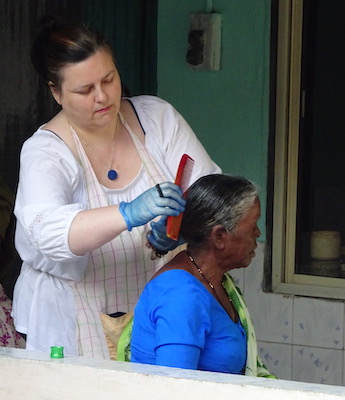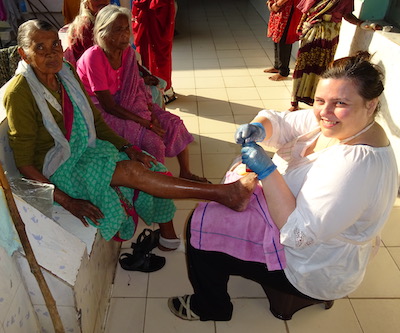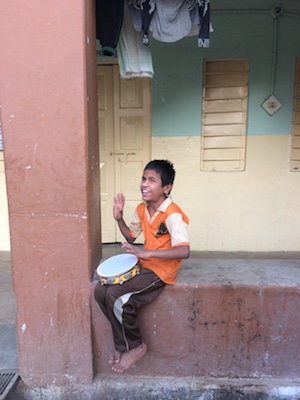On this page you can read the experience of participants from a variety of the activities and retreats that have been organised by SanghaSeva since 2004. If you have been on one of our retreats we would love to hear from you again please share your experience with us
I comb a tangled mass
oil long wavy hair
lice fall, between my fingers
I do not flinch.
My hands gently rub
her rough skin
trace missing toes
scars and bumps,
remnants of leprosy
tell a story
as we sing
as she rocks
back and forth
her eyes now
closed.

She is a child
in my hands
held and loved
her hair in plaits
her skin smooth
her back straight.
She sobs, I imagine
the sensation of touch,
after all who knows
how long she's sat on
the edge of this bed
the forgotten
the outcast
the elder
The giver of life
Maria Gornell


The overwhelming emotion I feel while volunteering at Anandwan is joy. I have now been there 3 times and am usually to be found in the old people's home (aka the wisdom bank) massaging the limbs of the elderly men. As soon as I see them a huge smile appears on my face and my heart warms and opens to these resilient yet vulnerable people. Although I don't speak their language, I feel we have a very strong connection through touch, and shared appreciation of us both being there. When I first went I had the attitude that I was going to give something to these people. Each time I am there I realise, with humility, that I receive so much more than I give, and for that insight alone I am truly grateful.
The retreat is extremely well organised by Zohar and Nathan and supported with daily meditations and teachings, which help us to stay grounded and connected to ourselves and each other. I would recommend this retreat to anyone who wants to share compassion with these human beings who have been marginalised by their own society as a way to bring joy both to yourself and to each of them.
Linda Vincent
When I first heard about the Anandwan retreat, I remember thinking that volunteering at a community for people disabled by leprosy wasn’t for me. But I soon became curious about this response and, realising it was rooted in fear, I started to reflect more on what my reaction was about. I recognised that it was partly based on ignorance about leprosy itself: I was carrying an assumption that leprosy is highly contagious, but later discovered this is far from the case. On another level, which felt deeper to me, more critical, I understood that my fear was about a need to distance myself from ‘the other’: anything and anybody that I needed to see as separate from myself, in order, essentially, to preserve the notion that sickness, ageing and death happen to other people but have nothing to do with me. Time went on and I became more and more open to attending the retreat to explore and confront my initial reaction.
Three years after first hearing about Anandwan, there I was with a group of other volunteers. The work we were invited to do during our stay ranged from food preparation, gardening, woodwork, wound dressing, nail cutting to massaging the elderly. It also included games and arts and crafts with hearing and sight impaired school children.
In the mornings, with several other volunteers, I chose to go to the old people’s homes where we gave massage to the elderly men and women. At first, I found it hard to look at - to really see - some of the disabilities people were living with. But soon, the disability became almost invisible as I was able to see through the barrier that I had, in effect, erected myself, to the person beyond.

Over the course of the mornings I spent there, I would repeatedly experience real joy through the connection created by the simple act of massaging someone who typically receives little, if any, intimacy or tenderness. Seeing the light in someone’s eyes as they felt the warmth of my hands made sense of why I was there.
I split the afternoons between spending time with the hearing and sight impaired children who live and go to school at Anandwan, and taking the elderly out in wheelchairs. The children, although demanding of attention as they have little extra input beyond school lessons, had a curiosity and energy that was infectious. I found myself becoming more playful, and able to dig in to reserves of stamina I didn’t know I had. It felt good to relax in to being with the kids and to put my own needs to one side.

The wheelchair rides, as we called them, also turned out to be a delight. We would do a circuit that included visiting the beautifully maintained graves of Baba Amte and his wife Sadhanatai, the founders of Anandwan in 1949. The old folks loved getting out of their homes and it was moving to see them pay their respects. The route followed a path with fields on either side where we would regularly spot kingfishers, hummingbirds and a whole host of other feathered friends. We would pass by a herd of goats and pause, watching them as they contentedly munched and browsed. Often, the men and women we were taking out would chat with people passing by or working in the grounds, people they used to work with or see everyday when they were younger and fitter. The conversations were usually vibrant, bringing great big smiles to the lined faces of the elderly folk.
There were so many of these moments that felt deeply joyful and I would try and take note of them, soak them up and absorb them while they were happening. But I think it was only really after I’d left Anandwan that, with a bit of distance, I could see the deeper and more ongoing effect of my experience of volunteering there. It was on a train journey that the real gift of the experience became clear to me.
It was a short journey by Indian standards, only eight hours. I normally love train travel but I was travelling across the heat of the day and was in sleeper class, non-AC. It was a busy train, hot and the rolling stock was old and grubby looking. Over the course of the trip everyone in the compartment I was in, myself included, did some or all of the following: eat, drink, remove shoes, sleep, chat, make phone calls, change a nappy. We were effectively living with each other in close quarters for the duration of the journey. There was no hiding. And I found that what the journey revealed so beautifully and unwittingly as the hours went by was how much we are all the same - in our needs to be fed, watered, sheltered, and in our desires for comfort, ease, peace and love.
The journey did feel long, the compartment often felt crowded, the train was not clean. But over the course of the trip, I watched as teenage lads joked with each other and as a father helped his wife feed their baby. I watched as people tried desperately to earn a living, walking the length of the long train in a bid to sell samosas, water, biscuits, fruit and noisy children’s toys. The journey turned out to be an opportunity for me to open up, relax, to see myself in other people and to see other people in me. I was the loving father, the playful teenager, the vulnerable baby, the giving mother, the generous older man with the wide smile (a dignified looking man who later took his bag and tied it up with string before getting off the train).
The train journey helped me see that at Anandwan - which translates as ‘forest of joy’ - I’d been given the opportunity to look deeply in to my heart. I’d confronted my own fear: I’d explored and faced what a friend I’d volunteered with there described as ‘leprosy of the heart’, a term that I think describes so well how closed our attitude to life can be; and how this attitude results in our separation from others and our separation from true selves. From being at Anandwan, I felt I’d come away more open, more free, more loving. It feels like I’m on a joyful journey that will carry on long after leaving Anandwan and long after disembarking the hot, busy train where, at times, I was able to feel real unity with my fellow travellers.

Clare Coyne
Attending the Being Peace retreat in Israel / Palestine was an experience that I am still striving to process.
It was my fourth Sanghaseva retreat each of which took place in a different location. The format of each retreat follows a pattern that allows for both inner reflection in periods of silence and meditation, and outward activity for a positive purpose undertaken as a group.
Somehow, contrasting what is happening in my own inner landscape, and what is happening in the outer landscape as I perceived it has become a point of reflection for me.
The very title of the retreat "Being Peace" sets the challenge of on the one hand maintaining an inner equilibrium and harmony with oneself, but also of interacting in the world in a way that brings that feeling to others.
The retreat gave me a great opportunity to notice how the barriers and checkpoints in the external world were mirrored in my own inner landscape, and to compare how exploring my own security, hostility, and values provides a chance to practise myself the qualities that I want to see in others.

For example, a separation wall is something I can put up between myself and someone I see as a threat, creating a distance between myself and them so that I don't have to deal with the discomfort I feel in their presence. Once that wall is erected, the chance to meet and discuss our differences or our common needs is obstructed. I can only guess what they think and feel about me.
The challenge of the landscape in the West Bank for me was to avoid placing myself on one side of the wall rather than working towards the understanding and friendship that removes the need for the wall in the first place.
On the retreat it was a joy to share the experience of the olive harvest. Harvesting fruit in the outer world is perhaps mirrored in the inner world by experiencing the nourishment of friendship and togetherness. OnThe Being Peace retreat it was inspiring to see people coming from very different positions and working together to try and stand on common ground.

One of the difficult things for someone like me who has not lived in a conflict zone was dealing with the feeling of disadvantage and inequality that goes with being in the presence of people with guns and power who don't consider you in a friendly way. This intense vulnerability is something that creates a disturbance in the inner peace and is a daily reality for too many people. I have left that situation, but the experience has given me an insight into how I might struggle to maintain a peaceful attitude when force is being used against me.
What gives me hope is that in a landscape dominated by barriers and razor wire, this retreat built on an inner landscape of friendship and togetherness that Zohar and Nathan have been cultivating with generous and kind spirits in the local Palestinian and Israeli community.
One of my first spiritual teachers taught that all violent acts contain the seeds of their own destruction. The truth I find in this statement is that in seeking to harm others we are also harming ourselves. This is true partly because in some respects we are all part of a web of life that whilst in competition also depends on that web to sustain us, lack of care and respect towards others damages us all, and starts to create a landscape of attitudes in which "me first", dominates love and compassion.
It surely cannot be acceptable to deny other human beings the rights we expect to be extended to ourselves. This issue of the fundamental inequality in rights extended to the Palestinian people was a shock to me and it continues to disturb me when political discussions in the media fail to recognise what is happening on the other side of the wall as "we" discuss "our" security.
The olive branch is a beautiful symbol of peace, and the tragedy of the landscape in Palestine is that the generous nature of people is being abused, and what might have been offered to share in friendship is being snatched away without recognition or honouring of the positive qualities that flourish between friends. These positive qualities were on show to me on both sides of the wall, and become even more of an inspiration in those who have been damaged grievously by the violence. Many of the olive trees were ancient and have endured through the generations providing sustenance and shade in a harsh and rocky landscape.

My final reflection is on religion. Where is religion located in my own landscape? For me, I couldn't find it in the Church of the Holy Sepulchre, at the Western Wall, or at any other specific location in the Holy Land. I find religion in the deep connections that transcend our separation from each other and bind us together in this common and fragile experience of life. I am sure each religion has its ways of providing this connection to what goes beyond our individual landscape and allows us to enter the space of each other hearts. Whatever this place looks like for each of us, I doubt that we need to protect it with a wall.
To all those who are sharing the olive branch of peace in these difficult times, thank you, and may we all share our harvest in the times ahead.
Ian Lindsay
Previously published on ClareCoyne.com as The Year of the Goat: Greece and Palestine
A couple of weeks after I came back from Being Peace this time, it was my 50th birthday; I was born in 1967. As I was reflecting on the passing of time in the run up to my birthday, I thought of a farmer I had worked alongside as we harvested olives near his home village of Deir Istyia, a dignified, kind and wise man who it is a joy to be around. We were talking about the military occupation of Palestine by Israel which began in 1967 following the Six Day War. This man, who is a year or two younger than me, described how his whole life has been lived under the Occupation. I was struck with acute sadness as I contemplated again how the good or bad fortune of where we are born can dictate a whole life's experience.
Something else I heard while we were in Deir Istyia was how the village has far fewer herds of goats now than it did twenty years ago. To some degree, this may be about general 'progress', natural shifts in lifestyle. But it also feels as if it is related to the land-grab being carried out through the Occupation which has such widespread and enduring consequences for the Palestinian way of life. I was thinking about this in relation to the goats I'd seen leaving and returning to the village every day and wrote a short poem:
Around the time of late
afternoon call to prayer,
a herd of goats returned to
the village, ears and bells
swinging. Long, silky ears
moving back and forth;
bells making a song that
was less ding
and more dong.
The goatherd walked alongside,
a man in his forties, maybe,
maybe older, wearing brown
trousers, a grey shirt, as if called
from his desk to guide the goats home.

We stood still as they passed,
watching them as they watched us,
wondering what else they had
witnessed that day, nimble, curious
creatures foraging for feed up and
down stony hillsides while farmers
harvested olives
under the eye of
settlers and soldiers, of
wire and fence and wall.
The deep red soil of the
olive groves turns darker
with every passing day,
with every passing year.
Goats come and go to the village,
fewer now, two herds where
once there were twenty.
Clare Coyne